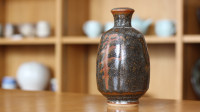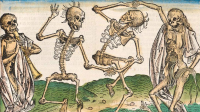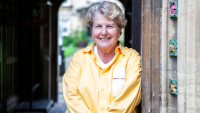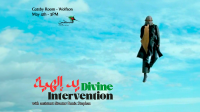How to rebuild a city with Karam Alkatlabe

The leadership of the Wolfson College Global Health Research Hub comprises world-renowned fellows of Wolfson College. Their combined experience provides opportunities to engage in interdisciplinary workshops, talks, research, and other events.
ORGANIZING COMMITTEE
Research Areas: Biochemistry
Godwin is a Leverhulme/Isaac Newton Early Career Research Fellow at the Department of Biochemistry, working at the interface of synthetic organic chemistry and industrial biotechnology. His research focuses on developing sustainable and clean approaches to Pharmaceutical synthesis.
Godwin studied pharmacy at Ahmadu Bello University, Zaria, Nigeria, graduating in 2008. He then worked initially as a clinical pharmacist, and later as a senior regulatory affairs officer with the (Nigerian) National Agency for Food and Drug Administration and Control.
In 2012, he moved to the UK as a postgraduate student and completed an MSc in Biotechnology and Enterprise in 2013 at the University of Exeter. He obtained a PhD in Chemical Biology in 2017, working with Professor Nicholas Turner FRS at the University of Manchester. He was a postdoctoral research associate at the Manchester Institute of Biotechnology between 2017 and 2020, in the group of Professor David Leys. In mid-2020, he moved to the University of Cambridge where he is a Leverhulme/Isaac Newton Trust Early Career Research Fellow at the Department of Biochemistry.
Contact:
DR. TIAGO CANELAS
Research Areas: Public Health, Global Health, Epidemiology, Spatial Epidemiology, Geospatial Science
Tiago is a Research Associate and member of the Global Diet and Activity Research Group and Network (GDAR). His research interests are the use of spatial data to understand public health problems. At GDAR, he will explore how climate, diet, physical activity and non-communicable diseases are related in the context of low- and middle-income countries
Tiago graduated in Geography (2011) and have an MSc in International Health (2012) from the University of Barcelona, Spain. He conducted his first research in spatiotemporal dynamics of malaria in Mozambique at the ISGobal.
In 2018, he obtained his PhD in Global Health and Sustainability at the School of Public Health at the University of São Paulo in Brazil, in collaboration with the Johns Hopkins School of Public Health. He focused his work on the risk of malaria transmission in the Amazon forest using the Geographical Information Systems (GIS) as a core method of analysis.
He joined the Liverpool School of Tropical Medicine in 2018 to work at the Partnership for Increasing the Impact of Vector Control (PIIVeC). He supported the PIIVeC cohort of researchers from Burkina Faso, Cameroon and Malawi in the spatial analysis queries. He also developed a geostatistical model to assess the feasibility of implementing a house-based malaria control intervention in the Ivory Coast.
Selected Publications:
Spatial targeting of Screening + Eave tubes (SET), a house-based malaria control intervention, in Côte d’Ivoire: A geostatistical modelling study
Constructing the field of knowledge of Global Health and Sustainability at the Universidade de São Paulo in the Latin American context
Contact:
Research Areas: Microbiology, Genomics, Molecular Biology, Mobile Genetic Elements, Pathogens Evolution
Dr Adrian Cazares is a microbiologist and genomicist interested in how bacterial pathogens emerge and evolve, and the genetic elements helping them to share genes that accelerate their adaption to challenging environments. He is currently a Research Fellow at the European Bioinformatics Institute (EMBL-EBI) and the Sanger Institute, and a Junior Research Fellow at Wolfson, where he also co-organises the Science Society. During his career, Dr Cazares has been awarded a series of grants to support his research, including postgraduate and postdoctoral fellowships from Mexican Research Councils (CONACyT and SECTEI), and, more recently, an ESPOD and JRF fellowship in Cambridge. Adrian's current research project uses a variety of experimental and computational approaches to uncover how plasmids have evolved to become vectors of antibiotic resistance genes. One of the project’s main goals is to use this knowledge to improve the global surveillance of multidrug resistance vectors and to guide the identification of mechanisms to stop their spread.
Selected Publications:
A megaplasmid family driving dissemination of multidrug resistance in Pseudomonas. https://www.nature.com/articles/s41467-020-15081-7
Eco-Evolutionary Effects of Bacterial Cooperation on Phage Therapy: An Unknown Risk? https://www.frontiersin.org/articles/10.3389/fmicb.2020.590294/full
Contact:
Research Areas: Genetics, Molecular Biology
Sean is a Leverhulme Trust Early Career Fellow at the Cancer Research UK Cambridge Institute. His current research focuses on the relationship between DNA structure and function. He works on 4-stranded structures called G-quadruplexes, which some of our DNA tends to fold into instead of the better-known double helix. 4-stranded DNA is abundant in cancer cells and may provide biomarkers or therapeutic targets. Sean’s work seeks to understand their function in gene regulation (how cells control which genes are turned on or off). Previously, as a PhD student at Wolfson College and the MRC Laboratory of Molecular Biology, Sean studied the nervous system, unravelling genes and molecular pathways that underpin brain function.
Selected Publications:
M. MALT-1 mediates IL-17 neural signaling to regulate C. elegans behavior, immunity and longevity. Nature Communications 11, 2099 (2020). https://doi.org/10.1038/s41467-020-15872-y
G-quadruplex DNA structures in human stem cells and differentiation. Nature Communications 13, 142 (2022). https://doi.org/10.1038/s41467-021-27719-1
Contact:
Research Areas: Stem cell therapies for neurodegenerative disease; the role of vitamins in neuronal development and neuroprotection; microfluidic platforms for modelling neuronal circuitry in vitro
Rosemary obtained her PhD in Neuroscience at Cambridge (Wolfson, 1992-1995). Her research career focused on developing stem cell therapies to replace neurons lost in neurodegenerative diseases such as Parkinson's and Huntington’s. Her more recent work explored the influence of vitamins B3 and D on neural development, and the development of a microfluidic platform to model complex neuronal circuitry in vitro.
Following postdoctoral positions at Lund University, Sweden, and Harvard Medical School, and a Wellcome Trust Career Development Fellowship at Cardiff University, she took up a position at the newly opened Keele Medical School, in 2005. She established the first year of the Keele undergraduate degree and from 2016-2019 was Director of Medical Sciences, responsible for delivery of pre-clinical education on the MBChB programme.
On return to Cambridge, she joined Wolfson’s Development Office team as convener for the Global Health Research Hub, and in 2022 took on the role of Director of Studies for Preclinical Medicine (Standard/Affiliate Course).
She has had a long association with Parkinson’s UK and is currently a member of their College of Experts. She has been Editor of NeuroReport Journal and is currently a Section Editor for Advances in Clinical Neuroscience and Rehabilitation.
Selected publications:
Nicotinamide restricts neural precursor proliferation to enhance catecholaminergic neuronal subtype differentiation from mouse embryonic stem cells. Griffin SM, Pickard MR, Hawkins CP, Williams AC, Fricker RA PLoS One 15(9):e0233477 2020
A Micro-fabricated in vitro Platform to Model Complex Neuronal Functionality of a Central Nervous System Circuit M Kamudzandu, M Köse-Dunn, M G Evans, R A Fricker and P Roach 2019 Biomed. Phys. Eng. Express 5 045016
Research Areas: Security, Risk and Resilience / Sustainability and Environmental Resource Governance
Linda is a Post-doctoral Research Associate at the Centre for Sustainable Development, Department of Engineering, Cambridge University. She holds a Master’s Degree in Geography from the University of Oxford and earned my DPhil from the Environmental Change Institute. Following completion of her doctorate, she joined the British Army as a Military Intelligence Officer and subsequently gained GIAC Cyber Threat Intelligence accreditation. She is currently part of the EU Commission's ReXuS project where she develops models which demonstrate how policy interventions in water, energy, food or climate have second and third order impacts within each sector and upon the achievement of the Sustainable Development Goals. These models will help decision makers create a balanced portfolio of actions to support the achievement of diverse development targets while avoiding perverse outcomes.
Selected Publications:
Flood risk management as a public or a private good, and the implications for stakeholder engagement. Environmental Science & Policy, 55, 281-291. 2016.
‘Contractual’ and ‘cooperative’ civic engagement: The emergence and roles of ‘flood action groups’ in England and Wales. Ambio, 44(5), 440-451. 2015.
IMOGEN SHARKEY OCHOA
Research Areas: Oncology, HPV, Epidemiology, Head and Neck Cancer
Imogen is currently in her final year of Graduate Entry Medicine having previously completed her PhD in Oncology at Trinity College Dublin, her MPhil in International Relations and Politics at Clare College Cambridge, and her BA in Human Sciences at St Catherines College Oxford. Her doctorate was the first of its kind, establishing the nation-wide epidemiology of HPV infection in oropharyngeal, oral cavity, and laryngeal cancer in Ireland. This data contributed to the WHO’s global data using its standardized techniques and contextualized the introduction of boys to the national vaccination program. Imogen’s medical interests for the future are in oncology, OBGYN, and medical teaching both in the UK and abroad.
Selected Publications:
The Role of HPV in Determining Treatment, Survival, and Prognosis of Head and Neck Squamous Cell Carcinoma https://doi.org/10.3390/cancers14174321
'I am grateful I received the HPV vaccine and will be for the rest of my life': https://www.thejournal.ie/readme/hpv-vaccine-3582556-Sep2017/
Research Areas: Optical Design, Molecular and Cell Biology
Stephanie is an imaging research scientist, artist, communicator, network creator. She has a strong background in light microscopy, optical design, molecular and cell biology as well as facility management and science communication. She has worked at the MRC Laboratory of Molecular Biology (MRC-LMB) on developing laser scanning and multi-photon imaging systems, as well as providing a link for the commercialisation of the imaging systems (Bio-Rad Microsciences). She established and managed the light microscopy facility at the CRUK Cambridge Institute at the Cancer Research UK Cambridge Institute (CRUK CI) and developed imaging and image analysis and technology platform networks. She teaches academically, and in lock-down initiated the ImagingOneWorld lecture series. She is passionate about scientific communication and public engagement. Stephanie has curated and developed Art and Science workshops and exhibitions (ArtCell Gallery) and exhibited her own photography world-wide.
Selected Publications:
Super-Resolution Structured Illumination Microscopy: Past, Present and Future. Trans A Math Phys Eng Sci (2021). 10.1098/rsta.2020.0143
Research Areas: Urban Planning, Human and Environmental Health and Sustainability, Waste Management, Disaster Risk Management
Sachi is an International Development professional with strong skills in Strategy & Project Management, Community Based Participatory Action and Research (CBPAR), Enterprise Innovation, Research & Analysis, and Monitoring & Evaluation. She completed a master's in urban planning from the University of Cambridge (Wolfson College) in 2022. Prior to her entering her master's program, she worked as an ESG & Impact consultant for an impact investing firm and ran her own social enterprise, Truss Group, which recycles plastic waste into construction materials and designs waste management systems for low-income areas in Malawi. Sachi has also been a Global Health Corps fellow, and is currently managing a Local Nature Recovery Strategy for Buckinghamshire County in the UK. She has been supporting the Health Hub's work over the past year and is the producer and host of the Hub's podcast.
Selected Publications:
https://globalhealthaging.org/tag/sachi-shah/
ADVISORY COMMITTEE
Research Areas: Genetics, Infectious Disease
Stephen Baker is a Director of Research based in the Department of Medicine at the University of Cambridge and an Honorary Professor at The University of Oxford. His research focuses on studying the mechanisms and epidemiological influences of antimicrobial resistant Gram-negative bacteria. His research group exploits various genomic and laboratory techniques to understand how antimicrobial resistant bacterial emerge, spread, and how best they can be combated. He has published >400 scientific articles and is a recognised name in global health with a portfolio of work ranging from typhoid fever and other enteric diseases to hospital acquired infections and zoonoses
Selected Publications:
The repurposing of Tebipenem pivoxil as alternative therapy for severe gastrointestinal infections caused by extensively drug resistant Shigellaspp. Elife. 2022 Mar 15;11:e69798. doi: 10.7554/eLife.69798. PMID: 35289746.
A return to the pre-antimicrobial era? Science. 2015 Mar 6;347(6226):1064-6. PubMed PMID: 25745145.
ASS. PROF. RAYMOND BUJDOSO
Research Areas: Pathology
Raymond Bujdoso completed a PhD at Cambridge University Department of Pathology. He is an Associate Professor at Cambridge University and is the Principal Investigator of an internationally recognised research group investigating the molecular pathology of prion diseases. He has held various positions including, Programme Director, Cambridge BBSRC Doctoral Training Partnership (DTP); Chairman, Faculties of Clinical Medicine and Veterinary Medicine Degree Committee; Director, Wellcome Trust Fundamentals of Veterinary Science Summer School; Theme Leader, Agriculture & Food Security (AFS) Cambridge BBSRC DTP; and is the Dean of Discipline, Wolfson College.
Contact:
PROF. GORDON DOUGAN
Research Areas: Genomics, Infectious diseases
Professor Dougan is a Professor in the Department of Medicine at Cambridge University and Director of the Infection Health Challenge area at Wellcome. He is an internationally recognised expert in vaccinology, global health and infections. He was Head of Pathogens at The Wellcome Sanger Institute (WTSI) and worked in the pharmaceutical industry. He studies the molecular basis of infection with a strong emphasis on pathogenic mechanisms/immunity, genomics, disease tracking and antibiotic resistance.
Before moving to the WTSI he was the founding Director of the Centre for Molecular Microbiology and Infection at Imperial College London and a Professor of Biochemistry. He is a member of EMBO, a Fellow of the Academy of Medical Sciences and a Fellow of the Royal Society. He has received awards nationally and internationally for his work, including the Albert B Sabin Gold Medal for his work on Affordable Vaccines. He received his B Sc and Ph.D. from the University of Sussex and conducted postdoctoral studies at the University of Washington (Seattle) in the laboratory of the Lasker Prize winner Stanley Falkow. During his work in industry developing novel vaccines at an internationally renowned multi-national company now part of GSK and is a founder of VHSquared and Microbiotica.
DR. NICHOLAS EVANS
Research Areas: Clinical Medicine, Geriatric and Stroke Medicine
Dr. Evans is a Consultant in Stroke Medicine at Addenbrooke's Hospital and researcher in cerebrovascular medicine at the University of Cambridge. His primary research focus is on imaging atherosclerosis – the hardening of arteries due to cholesterol – using positron emission tomography (PET) and magnetic resonance imaging (MRI). His work also considers the effect of clinical frailty – a state of functional decline and loss of physiological reserves – on vascular ageing and its effects on stroke recovery and outcomes. Dr. Evans has postgraduate qualifications University of Dundee and Harvard University. His research has been supported by The Dunhill Medical Trust, Academy of Medical Sciences, and the British Heart Foundation. He has received a number of distinguished awards including: the Harvey Prize for Vascular Medicine (Royal Society of Medicine), Binks Young Investigator Award (British Atherosclerosis Society), and a Quincentennial Lectureship (Royal College of Physicians).
Selected Publications:
Review of frailty in cerebrovascular health: https://journals.sagepub.com/doi/full/10.1177/17474930211034331
Interview: https://www.youtube.com/watch?v=vyjowHnEW4o
Contact:
DR. ERIKA IKEDA
Research Areas: Public Health & Primary Care
Dr. Ikeda completed a Masters of Health Science and PhD in Public Health at Auckland University of Technology (AUT) in New Zealand, focusing on physical activity in children and young people. She also trained in Sports Science and practiced as a physical education teacher at Juntendo University in Japan. In 2019, she was appointed Postdoctoral Fellow at the MRC Epidemiology Unit and the Centre for Diet and Activity Research (CEDAR) at the University of Cambridge. She supervises and teaches in the Department of Public Health and Primary Care. Erika is a member of the International Society of Behavioral Nutrition and Physical Activity, the International Society for Physical Activity and Health, and the Cambridge Metabolic Network. She reviews manuscripts for several journals including International Journal of Behavioural Nutrition and Physical Activity, Travel Behaviour and Society, and BMC Public Health.
Selected Publications:
International Children’s Accelerometry Database: https://ijbnpa.biomedcentral.com/articles/10.1186/s12966-022-01282-4
Keeping kids safe for active travel to school: https://www.sciencedirect.com/science/article/pii/S2214367X20301782#f0025
DR. FLORENCE NABWIRE
Research Areas: Sustainability Leadership
Florence is Prince of Wales Fellow at the Cambridge Institute for Sustainability Leadership (CISL) and an Honorary Fellow at the MRC Epidemiology Unit. She has a PhD in Biological Science from the University of Cambridge and a master’s degree in Applied Human Nutrition from the University of Nairobi, Kenya. Before joining CISL, Florence was an Investigator Scientist in the MRC Nutrition and Bone Health Research Group at MRC Human Nutrition Research Unit. Her current research aims to understand drivers of food consumption behaviour to inform development of strategies for achieving sustainable healthy diets in Sub-Saharan Africa.
Contact:
PROF. JOHN NAUGHTON
Research Areas: Journalism
Prof. Naughton is a Senior Research Fellow at CRASSH, Emeritus Professor of the Public Understanding of Technology at the Open University, Director of the Press Fellowship Programme at Wolfson College and the technology columnist of the Observer. By background a systems engineer, he is an historian of the Internet whose main research interests lie in the network's impact on society. At CRASSH, he is the co-founder of the Minderoo Centre for Technology and Democracy and was co-director two earlier, related projects (on Conspiracy and Democracy, and Technology and Democracy in the period 2012-2016. He has written extensively on technology and its role in society and is the author of a well-known history of the Internet – A Brief History of the Future (Phoenix, 2000). His most recent book, 'From Gutenberg to Zuckerberg: what you really need to know about the Internet', is published by Quercus.
Selected Publications:
https://www.theguardian.com/technology/series/networker
Blog: memex.naughtons.org
Contact:
DR. VIRGINIA NEWCOMBE
Research Areas: Clinical Medicine
Dr. Newcombe trained in medicine at the University of Queensland in Australia where she was awarded the University Medal. She came to the UK funded by Commonwealth and Gates Scholarships to complete a Masters in Epidemiology and PhD in Neuroimaging and Traumatic Brain Injury. After completing her PhD in 2009, Virginia dual-trained in Emergency and Intensive Care Medicine, and performed postdoctoral research as an NIHR Academic Clinical Fellow. The majority of her clinical training was in Cambridge and at The Canberra Hospital and The Alfred, Melbourne, in Australia. Since 2014, Virginia has held a Clinician Scientist Fellowship from the Academy of Medical Sciences and The Health Foundation. In 2018, Virginia was appointed as an Honorary Consultant in both Intensive Care and Emergency Medicine at Addenbrooke’s Hospital, as well as a Royal College of Emergency Medicine Associate Professor. Her main areas of research are in prognostication, fluid biomarkers and imaging in all severities of traumatic brain injury (TBI). TBI is a major cause of morbidity and mortality worldwide with an estimated 50% of the world's population being affected at some point during their lifetime. The rate of more severe injuries is increasing, particularly in Low and Middle Income Countries, which have particular challenges to improve outcomes and reduce the public health burden. These challenges are not unique to TBI and the Global Health Hub offers the opportunity to discuss and think about how they may be addressed.
Selected Publications:
Post-acute blood biomarkers and disease progression in traumatic brain injury. Brain. 2022 Apr 4:awac126. doi: 10.1093/brain/awac126. Epub ahead of print. PMID: 35377407.
CENTER-TBI Participants and Investigators. Relationship of admission blood proteomic biomarkers levels to lesion type and lesion burden in traumatic brain injury: A CENTER-TBI study. EBioMedicine. 2022 Jan;75:103777. doi: 10.1016/j.ebiom.2021.103777. Epub 2021 Dec 24. PMID: 34959133; PMCID: PMC8718895.
Research Areas: Public Health, Epidemiology
Dr. Oni is a Public Health Physician Scientist and urban epidemiologist, and Lead of the Global Diet and Physical Activity research group at the MRC Epidemiology Unit. She is an Extraordinary Professor and Chair at Innovation Africa, University of Pretoria where she leads the UrbanBetter satellite studio and also maintains an honorary affiliation at the University of Cape Town leading the Research Initiative for Cities Health and Equity (RICHE). Tolu completed her medical training at University College London, postgraduate medical training in the UK and Australia, a Masters in Public Health (Epidemiology) at the University of Cape Town, and research doctorate in Clinical Epidemiology at Imperial College London. She spent 11 years conducting research in South Africa, where she also completed her public health medical specialty training. As Director of the Global Diet and Activity Research Network, Tolu explores the intersection of urbanisation, climate change and population health equity conducting transdisciplinary urban health research that generates evidence to support development and implementation of healthy public policies in rapidly growing cities, with a focus on Africa. In 2020, she founded UrbanBetter, an Africa-led global urban health practice, learning collaborative and advocacy platform; connecting and mobilising individuals, communities and organisations to future-proof health and health-proof the future of cities. She has written extensively in academic and non-academic publications alike to advance scholarship and thought to build field of urban health research and practice in Africa and globally.
Selected Publications:
https://bmcpublichealth.biomedcentral.com/articles/10.1186/s12889-019-6674-8
Contact:
DR. HENRIK SALJE
Research Areas: Genetics, Epidemiology
Dr. Salje is an infectious disease epidemiologist working on the spread and control of pathogens. Dr Salje is a lecturer in the Department of Genetics where he heads the Pathogen Dynamics Group. He is also an Assistant Professor within the Department of Epidemiology at the Johns Hopkins Bloomberg School of Public Health. Before coming to Cambridge, Dr Salje worked at Institut Pasteur in Paris and Johns Hopkins University in Baltimore. Prior to starting his research career, Dr Salje worked in investment banking in London. He has degrees in Biochemistry from Oxford University, Biostatistics from Johns Hopkins, and Epidemiology also from Johns Hopkins. He uses mathematical, computational and field research to help our understanding of how pathogens spread in populations, to assess control efforts and support policymaking.
Selected Publications:
Reconstruction of antibody dynamics and infection histories to evaluate dengue risk
Contact:
Research Areas: Genetics
Professor Dr. Abhi Veerakumarasivam is an educator, science communicator, and geneticist. His research in cancer genetics involves the elucidation of components of the regulatory pathways that drive tumour recurrence and invasion as well as dissecting Asian genetic variations that confer differences in disease-risk and response to therapy. He received his doctorate from the University of Cambridge. Before joining Sunway University, he served at Universiti Putra Malaysia and Perdana University. In recognition of his achievements, he has been awarded multiple awards including the National Cancer Council Malaysia Cancer Research Award and the Merdeka Award Grant. He was crowned the Best Science Communicator at the 2016 International Famelab Finals in the UK. He is currently the Chairman of the Young Scientists Network-Academy of Sciences Malaysia (YSN-ASM) that represents top young Malaysian scientists who not only demonstrate academic excellence but also contribute towards nation-building through STEM promotion and advocacy. He is also currently the Chair of the International Network for Government Science Advice Asia Steering Committee and a member of the Global Young Academy. Abhi truly believes that the greatest healthcare challenges facing us in the 21st century can only be addressed through an interdisciplinary approach that promotes effective translation of scientific discoveries and enabling technologies that improve the quality of life and promote social justice. He also currently co-chairs the DIY Biology Working Group at the Global Young Academy.
PROF. NICK WAREHAM
Research Areas: Epidemiology, Public Health, Non-communicable diseases, Metabolic Disorders, Nutrition and physical activity
Prof. Wareham is the Director of the MRC Epidemiology Unit and co-Director of the Institute of Metabolic Science, the Centre for Diet and Activity Research (CEDAR), and was the founding Director of the NIHR-fundedGlobal Diet and Activity Research Group and Network (GDAR) until 2021. His principal research interests are the aetiology and prevention of obesity and diabetes, and he co-leads the Aetiology and Mechanisms of Diabetes and Related Metabolic Disorders of Later Life programme. He is an Honorary Consultant at Addenbrooke’s Hospital, Cambridge and was formerly a Wellcome Trust Senior Fellow in Clinical Science in Cambridge. He qualified in medicine from St Thomas’ Hospital Medical School, London, and trained in epidemiology and public health at the London School of Hygiene and Tropical Medicine, London, Harvard University, Boston, USA and at the University of Cambridge.
Selected Publications:
Wareham NJ, Herman WH. The Clinical and Public Health Challenges of Diabetes Prevention: A Search for Sustainable Solutions. PLoS Med 2016 26;13 (7): e1002097
Langenberg C, Sharp SJ, Franks PW et al. Gene-Lifestyle Interaction and Type 2 Diabetes: The EPIC InterAct Case-Cohort Study. PLoS Med 2014 11; 5: e1001647
Contact:
DR. JEREMY WEBB
Research Areas: Clinical Medicine and Medical Education
Dr. Webb was until recently a General Medical Practitioner who combined this role with supporting Undergraduate Medical students, Graduate Medical students and Postgraduate trainees. Originally qualified in Medicine at the University of London, Dr Webb worked as a physician in hospital for five years before becoming a GP. He completed a Masters in Medical Education, then became a Fellow of the Higher Education Academy. He was awarded the University of Cambridge Pilkington teaching prize in 2014. He helped to set up and run the Graduate Medical Course in Cambridge and now leads staff development (for medical educators) at the Clinical School where he is Sub-Dean, as well as at the Post Graduate Certificate in Medical Education at Institute of Continuing Education in Cambridge( Madingley Hall). During the pandemic Dr Webb developed a resource to support teachers to develop their remote teaching skills called “VME( Virtual Medical Education ) Lessons learned”.
Selected Publications:
Webb, J. “Creating a safe and effective learning environment” in ABC of Learning and Teaching in Medicine, edited by Diana F. Wood, et al., John Wiley & Sons, Incorporated, 2017. ProQuest Ebook Central,https://ebookcentral.proquest.com/lib/cam/detail.action?docID=4914172.
Webb, J. “Moving Clinical education online”, in 2020-21 Michaelmas Cambridge Centre for Teaching and learning, spotlight https://www.cctl.cam.ac.uk/newsletter/spotlight-clinical-medical-education-online
Contact:
DR. GILES S.H. YEO
Research Areas: Genetics, Genomics
Giles Yeo got his PhD in molecular genetics from the University of Cambridge in 1998, after which he joined the lab of Prof Sir Stephen O’Rahilly, working on the genetics of severe human obesity. Giles Yeo is now a programme leader at the MRC Metabolic Diseases Unit in Cambridge and his research currently focuses on the influence of genes on feeding behaviour & body-weight. In addition, he is a graduate tutor and fellow of Wolfson College, and Honorary President of the British Dietetic Association. Giles is also a broadcaster and author, presenting science documentaries for the BBC, and hosts a podcast called ‘Dr Giles Yeo Chews The Fat’. His first book ‘Gene Eating’ was published in December 2018, and his second book ‘Why Calories Don’t Count’ came out in June 2021. Giles was appointed an MBE in the Queen’s 2020 birthday honours for services to ‘Research, Communication and Engagement’.
Selected Publications:
https://www.nature.com/articles/s41576-021-00414-z
https://www.sciencefocus.com/comment/bmi-we-know-its-flawed-so-why-do-we-still-use-it/
https://www.theguardian.com/science/2021/jun/20/giles-yeo-why-calories-dont-count-diet-interview
Contact:

A display of works from the Bradshaw-Bubier studio pottery collection.

How we can develop ‘death activism’ – a variety of tactics and posthuman practices which celebrate death, its inevitability, its forms, from the slow to times of crisis, and how can trauma and mourning emerge as their own forms of expression, or even activism?

We are delighted to welcome Sandi Toksvig OBE as our speaker for Wolfson's prestigious Lee Lecture this year.

Join us for the 2024 Wolfson Research Event: an interdisciplinary academic conference organised by students to showcase the diversity of the research carried out by Wolfson students.

Screening of Elia Suleiman’s Divine Intervention, in conversation with assistant director Rania Stephan.







